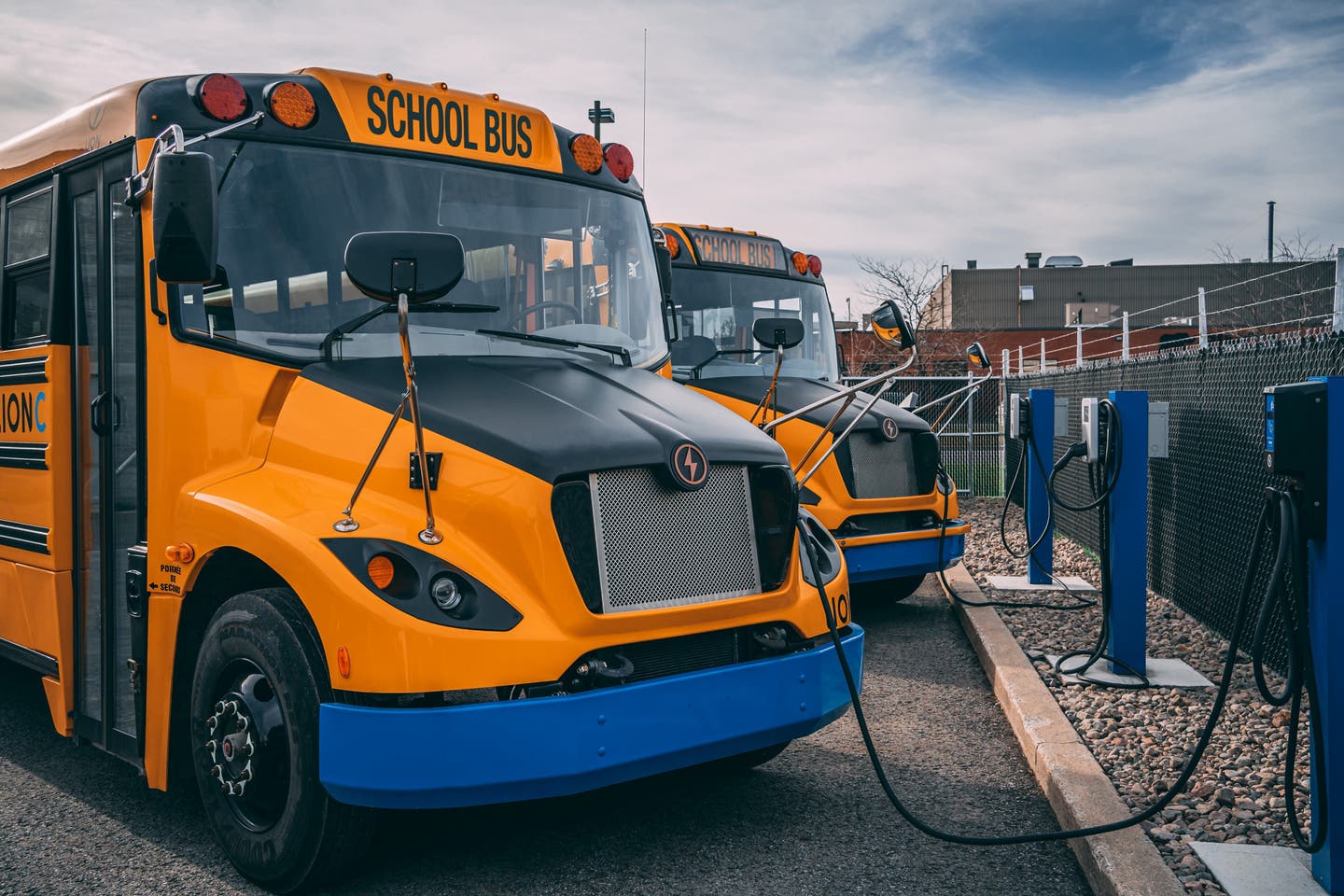Electric school buses provide significant health, cost and climate benefits, study finds
This study is the first to quantify the specific advantages of electric school buses on human and planetary health.

Replacing diesel school buses with electric ones could provide up to $247,600 in climate and health benefits per bus, according to a groundbreaking study by researchers at the Harvard T.H. Chan School of Public Health. This study, which will be published in the Proceedings of the National Academy of Sciences, is the first to quantify the specific advantages of electric school buses on human and planetary health.
The researchers discovered that these benefits, which include reduced greenhouse gas emissions and lower rates of adult mortality and childhood asthma, are particularly significant in large cities and for older bus fleets (those from 2005 and earlier).
“Research on air pollution and climate change should strive to quantify health benefits,” said senior author Kari Nadeau, John Rock Professor of Climate and Population Studies and chair of the Department of Environmental Health. “Our findings can inform policymakers that greenhouse gas emissions and air pollution are reduced by implementing solutions like electric vehicle use. Our data offer strong evidence that accelerating the ongoing transition to electric school buses will benefit individual, public, and planetary health.”
In the U.S., about half a million school buses are in operation, with a considerable number being older, highly polluting diesel buses. The transition to electric buses is a challenging decision for local, state, and federal officials due to the high costs and the previously unclear health benefits.
To measure the impact of diesel and electric school buses on the climate, researchers compared carbon dioxide emissions from diesel bus tailpipes with emissions from the electricity generation and battery production for electric buses.
To evaluate the health impacts, they assessed how each bus type’s emissions contribute to fine particulate air pollution (PM2.5), which is linked to adult mortality and the onset of childhood asthma.
Related Stories:
The study revealed that replacing an average diesel school bus in the U.S. fleet in 2017 with an electric one resulted in $84,200 in total benefits per bus. Each electric school bus emitted 181 fewer metric tons of carbon dioxide than its diesel counterpart, equating to $40,400 in climate benefits.
Additionally, each electric school bus provided $43,800 in health savings due to reduced air pollution and lower rates of mortality and childhood asthma.
The health benefits of electric school buses vary based on location and the age of the diesel bus being replaced. Large metropolitan areas, defined as those with populations over one million, experience the most significant health benefits from electrifying school bus fleets. The researchers calculated that replacing a 2005 diesel school bus with an electric bus in a large city would yield $207,200 in health benefits per bus.
“In a dense urban setting where old diesel buses still comprise most school bus fleets, the savings incurred from electrifying these buses outweigh the costs of replacement,” Nadeau said. “Not to mention how the tangible benefits of electric school buses can improve lives—especially for racial minorities and those living in low-income communities who are disproportionately impacted by the everyday health risks of air pollution.”
While the study provides substantial evidence for the benefits of electric school buses, it did not address the impact on children’s exposure to in-cabin air pollution while riding the bus. Further research on this aspect could provide additional insights for policymakers.
Ernani Choma, a research associate in the Department of Environmental Health, and Lisa Robinson, senior research scientist and deputy director of the Center for Health Decision Science, were co-authors of the study.
This research emphasizes the need for policy-driven solutions to promote the transition to electric school buses. By reducing greenhouse gas emissions and improving air quality, electric school buses offer a promising strategy to enhance both public health and environmental sustainability.
As policymakers and officials consider the costs and benefits of upgrading school bus fleets, studies like this one provide critical data to support informed decision-making.
For more science news stories check out our New Innovations section at The Brighter Side of News.
Note: Materials provided above by The Brighter Side of News. Content may be edited for style and length.
Like these kind of feel good stories? Get the Brighter Side of News' newsletter.
Joshua Shavit
Science & Technology Writer | AI and Robotics Reporter
Joshua Shavit is a Los Angeles-based science and technology writer with a passion for exploring the breakthroughs shaping the future. As a contributor to The Brighter Side of News, he focuses on positive and transformative advancements in AI, technology, physics, engineering, robotics and space science. Joshua is currently working towards a Bachelor of Science in Business Administration at the University of California, Berkeley. He combines his academic background with a talent for storytelling, making complex scientific discoveries engaging and accessible. His work highlights the innovators behind the ideas, bringing readers closer to the people driving progress.



